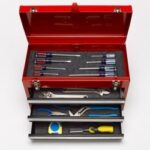Equipping your car workshop with the right tools is crucial for efficient repairs and successful business. This comprehensive guide provides a detailed list of essential hand tools, power tools, diagnostic equipment, and other supplies needed for any automotive professional looking to Buy Car Workshop Tools. We’ll cover everything from basic screwdrivers to advanced diagnostic software, ensuring you have the knowledge to make informed purchasing decisions.
Building Your Mechanic Tool Kit: A Step-by-Step Approach
Before diving into specific tools, let’s outline the path to becoming a mechanic, highlighting the tools needed at each stage.
1. Research and Education: Foundation for Success
Aspiring mechanics should start with a solid foundation in research and education. A high school diploma or GED is typically required, followed by thorough research into automotive technology and potential career paths. Hands-on experience with personal vehicles or internships at local repair shops can provide valuable early exposure.
2. Formal Training and Certification
Trade schools, community colleges, and specialized mechanic programs offer comprehensive training. Entry-level certifications from organizations like the National Institute for Automotive Service Excellence (ASE) can demonstrate competency in areas like engine repair, electrical systems, and brakes.
3. Apprenticeship: Hands-On Learning
Apprenticeships provide practical experience under the guidance of experienced mechanics. This on-the-job training is invaluable for developing real-world skills and building a professional network. Dealerships and repair shops often offer apprenticeship opportunities.
4. Professional Certification: Establishing Expertise
After gaining sufficient work experience (typically one to two years), mechanics can pursue ASE certification. This nationally recognized credential validates expertise and can significantly enhance career prospects.
Budgeting for Your Car Workshop Tools
Building a comprehensive tool collection is an ongoing investment. While the exact cost varies, a typical mechanic’s tool inventory can range from $7,500 to $11,000, with specialists investing upwards of $27,000. Plan your budget accordingly, prioritizing essential tools initially and gradually expanding your collection as your career progresses.
Essential Hand Tools: Precision and Control
Hand tools are the foundation of any mechanic’s toolkit, providing accuracy and control for a wide range of tasks.
Screwdrivers: Versatile Fastening Tools
Invest in a comprehensive screwdriver set that includes various sizes and types, such as Phillips, slotted, and Torx. A precision screwdriver set is also essential for working with smaller components and electronics. Consider sets from reputable brands like Milwaukee and GearWrench.
Pliers: Gripping, Cutting, and Bending
A variety of pliers is essential, including slip-joint, needle-nose, diagonal cutting, and locking pliers. Look for pliers with comfortable grips and durable construction. GearWrench’s Pitbull pliers are known for their exceptional grip and cutting ability.
Wrenches: Applying Torque to Fasteners
Wrench sets, including combination wrenches (with both open and box ends), adjustable wrenches, and torque wrenches, are essential for tightening and loosening fasteners. Ratcheting wrenches can significantly speed up the process. GearWrench offers high-quality wrench sets with innovative features like flex heads and 72-tooth ratcheting mechanisms.
Sockets: Versatile Fastening Solutions
Socket sets provide a wide range of sizes and drive types for various fastening applications. Impact sockets are designed for use with impact wrenches and can withstand high torque. GearWrench and Milwaukee offer comprehensive socket sets that meet professional standards.
Hammers, Pry Bars, and More
Other essential hand tools include hammers (ball pein, rubber mallet, dead blow), pry bars, chisels, punches, files, rasps, and hacksaws. Choose tools made from durable materials like forged steel and fiberglass.
Power Tools: Efficiency and Speed
Power tools significantly enhance efficiency, allowing mechanics to complete tasks quickly and with less physical effort.
Drills and Impact Drivers: Versatile Powerhouses
Cordless drill/driver combinations are essential for drilling holes, driving screws, and removing fasteners. Look for brushless models with high torque and long battery life. DeWalt and Milwaukee are leading brands in this category.
Impact Wrenches: Breaking Loose Stubborn Fasteners
Impact wrenches deliver high torque to quickly remove lug nuts, bolts, and other fasteners that are difficult to loosen with hand tools. Milwaukee’s M18 FUEL impact wrench is a popular choice for its power and durability.
Grinders, Saws, and Sanders: Shaping and Finishing
Angle grinders are used for cutting, grinding, and polishing metal. Reciprocating saws are versatile cutting tools for various materials. Sanders (belt, orbital) are used for smoothing and finishing surfaces. Makita and DeWalt offer a wide range of grinders, saws, and sanders for automotive applications.
Air Compressors: Powering Pneumatic Tools
Air compressors provide the pressurized air needed to operate pneumatic tools like impact wrenches, air ratchets, and spray guns. Makita’s MAC2400 is a reliable and powerful air compressor for professional workshops.
Diagnostic and Testing Tools: Identifying Problems
Diagnostic tools are essential for troubleshooting vehicle issues and ensuring accurate repairs.
Multimeters: Measuring Electrical Parameters
Multimeters are used to measure voltage, current, resistance, and continuity in electrical circuits. Fluke and Amprobe offer high-quality multimeters for automotive diagnostics.
Compression Testers: Evaluating Engine Health
Compression testers measure the pressure in engine cylinders to diagnose problems with piston rings, valves, or head gaskets. Proto offers reliable compression testers for professional use.
Other Diagnostic Tools
Other essential diagnostic tools include battery testers, oil pressure check kits, scan tools (for reading and clearing diagnostic trouble codes), and vacuum gauges.
Other Essential Supplies: Supporting Your Work
In addition to tools, various supplies are crucial for a well-equipped car workshop.
Safety Gear: Protecting Yourself
Prioritize safety with essential gear like work gloves (Mechanix Wear offers excellent options), safety glasses, hearing protection, and work boots.
Shop Organization: Efficiency and Cleanliness
Keep your workshop organized with toolboxes, tool chests, workbenches, and storage cabinets. Invest in shop towels, cleaning supplies, and a creeper for comfortable work under vehicles.
Conclusion: Investing in Your Success
Building a complete car workshop requires a significant investment in tools and equipment. By understanding the essential tools outlined in this guide, you can make informed purchasing decisions and equip your shop for success. Remember, quality tools are crucial for efficient repairs, customer satisfaction, and a thriving automotive business.



